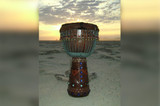Drumming in Cold Weather
Drum circles happen in all climates, and during all times of the year. Some circles are inside, away from the elements and allergens, while others maintain their presence in the great outdoors. For drum circle drummers who like to bang their Djembe or shake their shekere au naturel, facing the extremes of temperatures may just be part of the whole drumming experience, but it never hurts to have some extra advice, especially when drumming in cold weather climates.
In cold weather seasons or climates, the natural skin of the drum may need a little extra care. Colder temperatures are brought by dry air, and dry air can dry the head of the drum. Aside from keeping your Djembe or other drum in a bag or case when not drumming, it is recommended that a touch of natural oil, like olive oil, be used on the drum head to help protect it. By applying a small amount of oil to the skin a day or so in advance, you are helping to keep it protected from the cold air, more than even the natural oils in your hands can.
The skin of your own hands can take a beating, literally, when drumming outdoors in cold temperatures. Since the sound quality of drumming will suffer while wearing gloves, its best to leave them in your pockets and opt for fingerless gloves or even shorter periods of play. Your hands are just as much a part of your drumming as your djembe, and caring for them in the same manner will save you from dry, cracked, chapped hands. If you do play, be sure to keep your hits and strikes softer than normal to minimize any pain that comes from cold hands, and if you can possibly use pocket heat packs between solos and fills, your hands will thank you.
Cold weather does not have to prevent a drummer or percussionist from participating in a drum circle. Many times, the drumming during these times can reflect not only the cold, but also a more somber or reflective tone to the songs and rhythms. Keeping your djembe, shekere or other instrument in shape for the cold weather is just as important as caring for your own skin, especially when the other drummers in the circle are counting on your creative addition to the sound of the group.
Recent Posts
-
What is the Best Size Djembe for Beginners?
If you're new to the world of percussion and interested in learning the djembe, you're in for a t …16th Jul 2024 -
The Benefits of Becoming a Drumming Teacher: Transforming Passion into Profession
Why become a drumming teacher? Becoming a drumming teacher is an excellent way to share your pas …22nd May 2024 -
What Makes the Djembe Drum a Spiritual Instrument in African Music?
Origin and history of the Djembe drum The Djembe drum originates from West Africa and holds sign …16th May 2024



